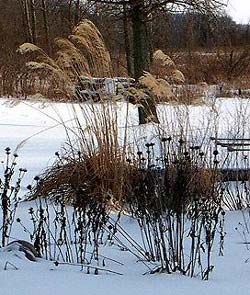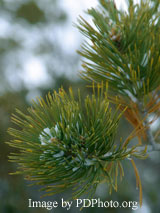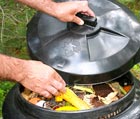- Gardening Tips |
- | What's NEW! |
- | Contact Us |
- | Sitemap
Wintering Your Garden
Wintering your garden may be vital to ensure your plants have adequate protection during the colder weather.
The flowers and plants listed on the Easy Care Plants page are typically hardy to about -35° F (about -37° C). However, to insure the health and vigor of your flowers and plants for next year, a little winter garden care is needed.
In the fall is when you'll make preparations for the coming cold. As your plants begin to fade and wither, cut back the stems to a little above ground level.

You'll want to protect your flowers and plants from the blowing frigid winds and quick temperature changes.
Fluctuating temperatures will cause the ground to expand and contract or heave. This may cause plants to become uprooted and exposed.
Believe it or not, cold weather protection is done to help keep the soil frozen during the freeze-thaw periods.
Keeping the soil frozen during these periods will help to prevent any new plants from being heaved or pushed out of the ground and reduce the possibility of winter damage to the plants.
Covering Garden Beds
After the first frost you'll want to cover your gardening area with a layer of protection to help prevent any severe heaving of the ground.
Weighted-down evergreen branches are a good way to do this. The coming snow should then help to keep the branches held down.
It is better to use the evergreen branches or an organic mulch for protecting your garden areas rather than using bark mulch.
The bark mulch may become compact and hard and can more easily hold excessive moisture during the winter.
The depth of your flower and plant covering should be based upon the severity of your cold season. The colder your winter, the more protection you may want to provide for your garden areas.

By using the evergreen branches as protection, when spring arrives, you'll push aside this covering before the new growth begins in your garden.
You could choose to use an organic mulch as cold weather protection instead.
Some of these organic materials might be compost, ground corncobs, rice or peanut hulls or other similar type material.
If you use the organic material, allow the mulch to remain in your garden areas once spring arrives.
Over the colder season of your area the organic mulch has begun to decompose and will continue to provide beneficial nutrients to the soil as time goes on.
Related Information:
To Top of this Wintering page
Return to Gardening Tips Home Page
Gardening Updates
Note: We'd love you to send us your favorite garden pics to feature on our new pages!
Contact Us and we'll send you an email address that can accommodate your photographs.

